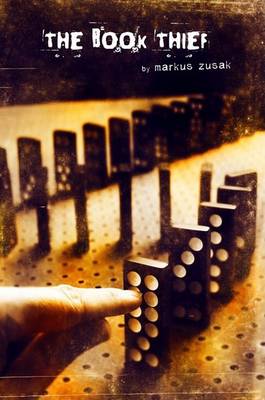Reviewed by brokentune on
The Book Thief will be coming to the cinemas next month. I am eagerly waiting to see it. I am an admirer of both Geoffrey Rush and Roger Allam and maybe, just maybe, they can salvage the story for me.
It’s not that it is a particularly bad story: It begins with the heroine, Liesel and her brother, being sent to live with foster parents during the second world war and describes her life in a small town near Munich, how she grows fond of books, how she adapts to her new family and friends, and how Hitler’s regime marks the lives of the people around her. The premise of the book is promising.
However, the problems I have with the book are so manifold that they outweigh any of the potential I might have seen in Zusak’s work within the first 30 pages. In fact, the first half of the book annoyed me so much that I needed to vent to a friend and ask for some reassurance that there are any good points to the story at all.
So, despite its flaws, I struggled on to finish the book - only to form a clearer picture of why the book was so underwhelming:
The Narrator: I dig the idea of Death being the narrator of the story, I really do. It’s not novel but it does give the story a potentially interesting vantage point. You know with Death being the great leveller – unbiased, somewhat detached from the bickering of mortals, etc. Except, Death’s narration is so inconsistent that apart from the odd interjections of pointing out that the story is narrated by Death, it is not clear whether the story is told by death or by a child. But it is clear that Death is not a child, if that makes sense, because the narration – especially in the forst half of the book changes from between childlike and all-knowing and patronizing. That inconsistency really irked me.
Max Vandenburg: I like the character of Max. What I didn’t get was that his character was so anxious and feeling undeserving of the help he receives from the Hubermanns. I mean, Max was a fist fighter, and yet for much of his introduction to the family he is totally without fight or any sense of self-worth. This could have done with some more background in order to make the character work. But as it was, Max’ role in the book was not much more than a cliché.
Atmosphere: Was there any? The story says it is set in a small town near Munich, and yet it does not feel like it. I didn’t get any sense of where the story was set. It could have been anywhere, any time. There was a distinct lack of detail and description of anything. Even though, by nature of the setting – Bavarian small town – there would have been a lot to write about which could have transferred a sense of setting to the reader. Trust me, if you find yourself in Bavaria you will know about it.
Authenticity: This is of course closely related to the missing sense of atmosphere, but what really, really irked me was the incessant use of the Hubermann’s favourite terms of endearment: “Saumensch” and “Saukerl”. Not that they are particularly harsh but they do seem a peculiar choice when looking at the plethora of Bavarian expressions.
Language: Maybe it was just the Kindle edition but the book really could have done with some proofreading – come on either go for the German street names or the English but mixing both throughout just was another inconsistency that did my head in. As for the general language used – was there a point to all the clichés, metaphors, oxymorons and other linguistic devices? Was it a bet of how many Zusak could fit in? Or was it just the author’s intention to come across as pretentious?
Lastly, I just simply have no idea what the book’s intention is. Or for that matter, who it is written for. Is it meant to be read by young adults or adults? Is it about the holocaust? Is it about a childhood story? I don’t know. Zusak touches on both but doesn’t follow through with either. Could he not make up his mind? Was he just too ambitious?
Or did he actually intend to write a story that to me reads as no more than insincere twaddle. Kitsch at best.
So, Geoffrey and Roger, there is quite a task upon you. Please make up for the book’s faults and make it work on screen.
Reading updates
- Started reading
- 26 January, 2014: Finished reading
- 26 January, 2014: Reviewed
